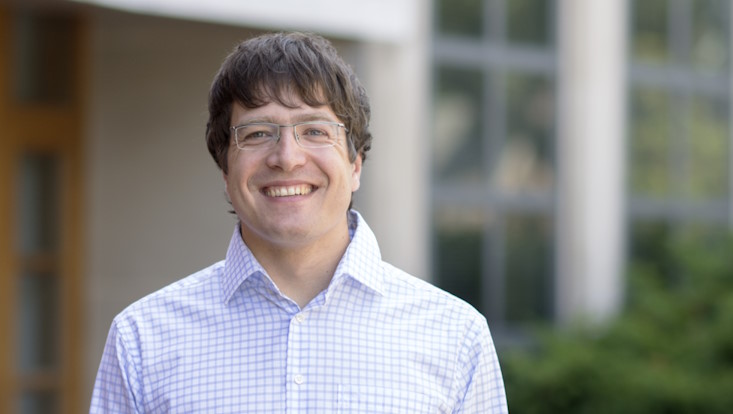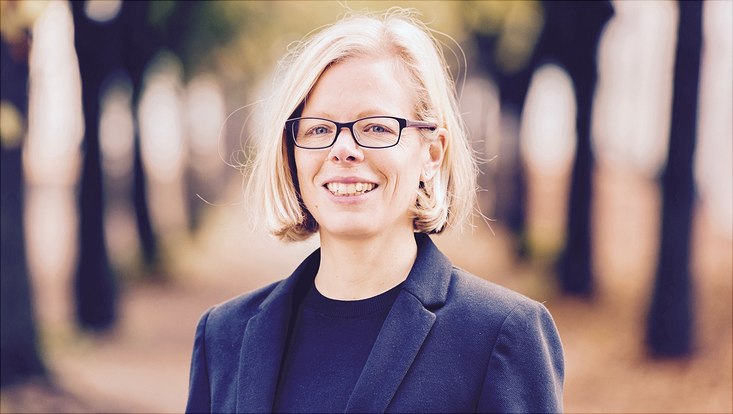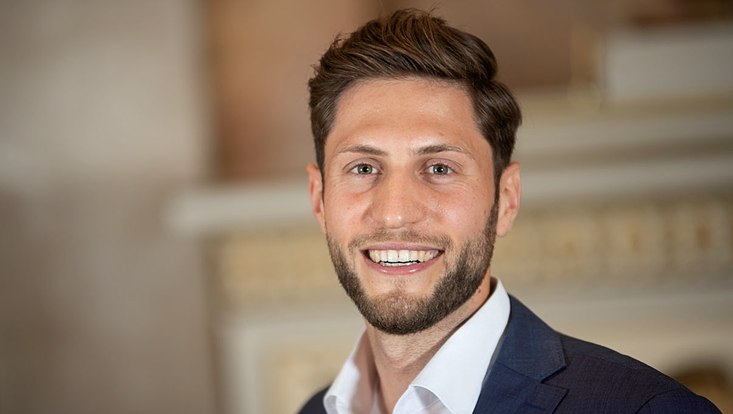Welcome aboard!“Quantum Physics Lays the Foundations for the Recent Exciting Developments in Quantum Technologies”Prof. Dr. Peter Schauss strengthens the Faculty of Mathematics, Informatics and Natural Sciences
16 October 2024, by Schauss/Red.

Photo: Private
Every year, the University of Hamburg welcomes numerous new researchers. This series introduces them and their areas of research. This time: Prof. Dr. Peter Schauss.
Prof. Dr. Peter Schauss came from the University of Virginia, United States, and has been working at the Institute for Quantum Physics and the Cluster of Excellence CUI: Advanced Imaging of Matter since 1 September 2024.
My research area in 3 sentences:
The development of new quantum technologies requires a deep understanding of quantum physics. The focus of my research is on quantum simulation and quantum computation with ultracold atoms. Quantum physics of many particles is very hard to calculate on classical computers and the use of well-controlled quantum systems for quantum simulation or computation may lead to more efficient ways to access and understand complex quantum systems.
On the one hand, we study quantum many-body systems on the single-site level in optical lattices, which resemble model systems that are believed to describe aspects of high-temperature superconductivity.
On the other hand, we work with individual atoms in optical tweezers for quantum computing and quantum information. The indistinguishability of atoms of the same isotope makes them great candidates for qubits, and recent progress has brought the field closer to realizing long-lived entangled states of neutral atoms.
These are my plans at the University of Hamburg:
Ultracold atom experiments have been mostly based on the imaging of large samples. Recently, with up-and-coming applications in quantum computing, it has become essential to control and image individual atoms. I have been working for a long time on so-called quantum gas microscopes, which enable simultaneous imaging of many individual atoms. My first plans are to move and establish my current microscope experiment in Hamburg and set up a new experiment with applications in quantum computing. This new experiment connects well with the ongoing quantum computing and quantum optimization efforts in the Rymax One project. I aim to strengthen the Institute of Quantum Physics and the Cluster of Excellence CUI: Advanced Imaging of Matter in Hamburg with new collaborative projects and increase international visibility.
This is why students should attend my courses:
Modern technologies rely increasingly on quantum effects. While quantum physics itself was the center of study for many years, there is now a trend toward using quantum effects as a tool for other applications. This includes quantum simulation, where complex quantum systems are realized using the so-called cold-atom toolbox in well-controlled experimental systems, and quantum computing, which relies on exploiting the increased computational power provided by quantum effects. I will work to integrate the newest developments in quantum physics and quantum technologies into my teaching and have connections to several quantum computing startups, which will help provide the required knowledge for working in cutting-edge industry projects based on quantum technologies.
This is how I explain my research to my family:
On very small scales, the laws of classical physics do not describe nature well anymore. For example, particles like electrons—which are modeled as point-particles in classical physics—start to show wavelike features at small scales. Experimentally, accessing these deviations from classical physics is hard to detect and requires often sophisticated experiments. In my research, we realize and characterize states with many atoms that show such deviations from classical physics to gain more fundamental insights into quantum models. We use these quantum effects to improve our understanding of other quantum systems like condensed matter systems or to apply them to quantum technologies like quantum computing.
My research is important to society because:
With the increasing miniaturization of computer processors, the length scales of integrated circuits reach into regimes where quantum effects become important. Therefore, the understanding of quantum physics is already now a central piece in designing new computers. While quantum effects were previously suppressed to maintain reliable classical computing at very small scales, next-generation quantum devices will rely on quantum physics in their working principle. Developing such devices requires a deep understanding of quantum physics, which can be obtained by realizing complex quantum systems with ultracold atoms. A few systems based on ultracold atoms are already in practical applications, which include optical atomic clocks that help to improve timekeeping, for example, for increased GPS accuracy in the future.
That’s why I’m looking forward to Hamburg—both the city and the University.
I am looking forward to working at the University of Hamburg and at the Institute for Quantum Physics to push forward our challenging projects together with the great colleagues in experimental and theoretical physics.
On a personal note, I have been living in the United States for 9 years now, where I moved after obtaining my doctorate in Germany. I am looking forward to moving back to Germany, meeting old friends, and working together with colleagues at the University of Hamburg.
I am also looking forward to the lower temperatures in Hamburg compared to Virginia, to biking on real bike lanes in the surroundings of Hamburg, and enjoying the cultural events Hamburg has to offer.
Reaching out to the world:
I hope to strengthen international collaboration in Hamburg, in particular through my connections with the United States and my friends and colleagues that hold professorships and research positions all over the world, including France, Italy, the United Kingdom, Austria, China, Japan, and South Korea. I have collaborated on projects with several research groups in the United States, Canada, Brazil, and France.


